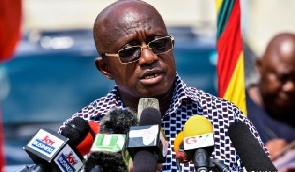Simon Osei Mensah, the Ashanti Regional Minister, has warned against the continued stigmatisation of persons infected by the Coronavirus disease (COVId-19).
He said stigmatisation was undermining efforts to get suspected people in communities to test for the virus and seek prompt treatment for positive cases.
Launching an anti-stigmatisation campaign on Covid-19 patients in Kumasi, Mr Osei Mensah said it was a major challenge for tracing and testing in communities.
The anti-stigmatisation campaign is a collaborative initiative between Bloomberg Philanthropies, Vital Strategies and the Education Sub- Committee of the Kumasi Metropolitan Assembly’s Public Health Emergency Committee.
It aims at embarking on a media/community-based anti-stigma campaign to change the negative attitude of people towards persons who have recovered from the disease in the communities.
Mr Osei Mensah said it was becoming extremely difficult to get isolation centres in the communities for COVID-19 suspected persons due to stigmatisation.
“That is why suspected persons are made to do self-isolation in their homes, which is also becoming difficult to contain the spread”.
He said Ghana could have done even much better in the tracing, testing and management of the virus if stigmatisation was not unnecessarily associated with it.
Mr Osei Mensah commended the Government for the measures and achievement so far and urged the people to adhere to all the preventive and restrictive protocols to fight the virus.
Dr Ruth Owusu-Antwi, the Head of the Psychiatry Unit of the Komfo Anokye Teaching Hospital (KATH), pointed out that structural and public stigmatisation were making it difficult to reintegrate persons recovered from the disease into society adding that the campaign was the first step towards achieving that goal.
She said education targeted at removing the myths, misconceptions and misinformation of the Covid-19 and specific desired behavioural change attitudes were needed in the campaign to stop stigmatisation.
She stressed the need for the media to produce more balanced and appropriate content on the COVID-19 to help reduce fear and panic associated with it, which was fuelling stigma.
Dr Oheneba Owusu-Danso, the Chief Executive of KATH, said the disease had now become endemic, hence the need for people to understand its dynamics and prepare to stay with it.
He said strict adherence to the preventive protocols was the surest way to stay safe of the virus.
Mr Osei Assibey-Antwi, the Chief Executive of KMA, said the campaign would involve the design and deployment of anti-stigmatisation communication materials in the media and local communities to sensitise the public to change the negative attitudes towards recovered persons.
Click to view details



General News of Thursday, 4 June 2020
Source: GNA

















